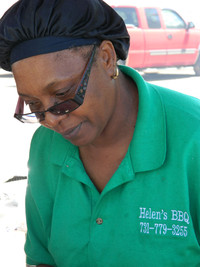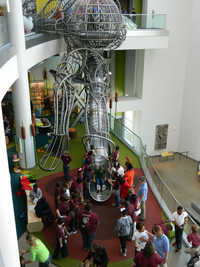By Steve Bergsman
When I traveled in the west Tennessee delta country — from Memphis to Union City in the far northwestern corner of the state — I expected the predictable phenomena, such as rolling lush farmland, dying old hamlets and the sound of bluesman in the night. What I didn't expect was the iconoclasm and quirkiness of the region.
In Los Angeles everyone has heard of the famed Watts Tower, a fantastic urban sculpture that is true folk art. It was shaped by one man who was determined to fulfill a vision. But it pales in comparison to Mindfield, the immense folk art sculpture found on a commercial street in the small town delta town of Brownsville. This sculpture is sometimes referred to as Mindfield Alley because it's located on a narrow stretch of wasteland between an old motel and a forlorn strip mall.
When I first saw it, I thought it was a power company substation because the mostly steel sculpture is painted in industrial gray and rises up like transmission poles, but then I looked closely and saw the erratic formations, cut messages, bridge trusses, water tower, canoe, augurs — and there is probably a kitchen sink in there that I just didn't notice.
Sculptor Billy Tripp began Mindfield in 1989, and he is still at work on it. Right now the highest point is probably 150 feet, but if you look past the hotel you see an immense new addition that is actually the steel framework of an old drive-in movie theater screen.
I was standing in the parking lot of the strip mall with a group of others looking at Mindfield when a van pulled up and out popped Tripp's wife, Beth. She asked if we wanted a tour of the thing, and she was kind enough to walk us through and interpret the different parts.
For example, the canoe is the actual canoe used by author William Least Heat Moon, who wrote "Blue Highways." The revolving silhouettes atop are of Billy and Beth, and the etched words "and so now Billy begins your life without him" refers to the death of Billy's father. The carved letters "MF" stand for Mindfield.
Nearby is the 150-year-old building that houses Helen's Bar-B-Q. The nondescript little house near a lonely intersection is often hard to see because of the cars and trucks pulling in for takeout. There are only two tables at Helen's.
Helen Turner, known as the queen of barbecue, operates the eatery. Unlike Mindfield, her restaurant is quite well-known and frequently featured in magazines. When I was there, I gobbled up the barbecued chicken, which she only makes on order. Pretty much everyone else orders the ribs, but I'm told her real delicacy is barbecued baloney.
For pure orneriness or visionary entrepreneurship, it's hard to beat Union City native son Robert Kirkland, who founded the gift-store chain Kirklands. After selling the chain to a venture capitalist, Kirkland wanted to do something to help his hometown, which was a dying industrial city. On the outskirts of town he built the $100 million (and still counting) Discovery Park of America, a combination Smithsonian Institute and Knott's Berry Farm — a mash-up of museum and amusement park. Despite being in the heart of rural America, Discovery Park, which opened in November 2013, has already attracted 150,000 visitors.
The day I visited the place was crowded with schoolchildren — by one count 800 of them. The highlight of my visit was the earthquake simulator, but I could see that the younger kids preferred the three-story slide in the shape of a robot.
I met Kirkland and his wife, Jenny, while I was at the park. At an age when most men have long since retired, he was sketching out planned additions. He's a funny guy, an entrepreneurial Henny Youngman who was forever joking about his wife. His best line: The secret of being married for 48 years is either be happy or right. His secret for Discovery Park: education, entertainment and tourism.
Further to the southeast but also in the delta sits the town of Jackson, where a caboose sits high above the local buildings on two poles like a billboard. In fact it is a billboard for Casey Jones Village, a large themed enterprise of museums, shops and eateries dedicated to preserving Southern Americana. Indeed, the newest addition to the village is an 1837 antebellum mansion that was slated for destruction but saved and transported to Casey Jones Village to serve as a wedding venue.
The village was founded by Brooks and Anne Shaw and is now in its second generation of Shaw management by siblings Brooks and Deborah. I had a vague memory of the name, thinking it was another heroic figure in a tall tale, like Pecos Bill or Paul Bunyan. In fact Casey Jones was a real person, a hero engineer who saved lives by crashing his train and losing his own life. The real eye-opener to me was the Casey Jones Museum, which highlights the cultural phenomenon in songs, books, games, gewgaws, television shows and movies.
Two other stops I'd recommend in the delta region are the Alex Haley Museum and Interpretive Center in Henning, which is dedicated to the iconoclastic author who wrote "Roots" and the town of Denmark, population seven. Check out the haunted 1854 Denmark Presbyterian Church, which was built by slaves, and the cemetery, often goblinized by locals in period garb and with stories to tell.
WHEN YOU GO
Mindfield: Admission is free: 344 W. Main St., Brownsville, Tennessee.
Helen's Bar-B-Q: 1016 N. Washington Ave., Brownsville. Phone 731-779-3255.
Casey Jones Village in Jackson, Tenn.: www.caseyjones.com
Discovery Park of America in Union City: www.discoveryparkofamerica.com
Alex Haley Museum and Interpretive Center in Henning: www.alexhaleymuseum.org
The Denmark Presbyterian Church in Denmark is on Route 223 (Denmark Jackson Road).


Steve Bergsman is a freelance writer. To read features by other Creators Syndicate writers and cartoonists, visit the Creators Syndicate website at www.creators.com.






View Comments